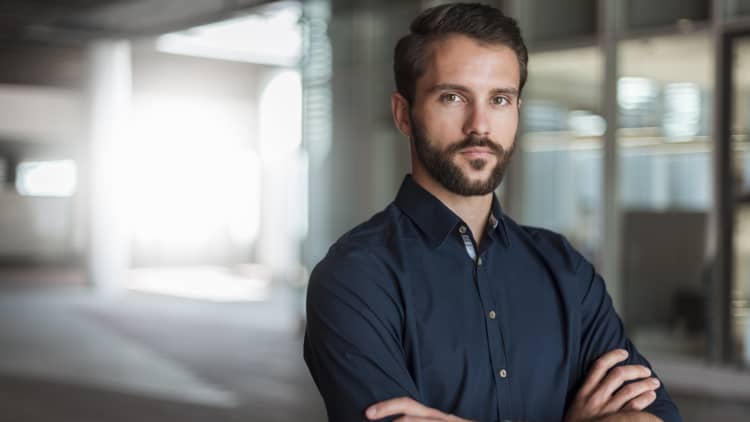As the CEO of Facebook, a business that has the attention of billions of people, Mark Zuckerberg has incredible power.
And that's what makes the Facebook chief executive "the most dangerous person in the world," New York University Stern School of Business professor Scott Galloway said on "Bloomberg Markets: The Close" on Wednesday.
Galloway, who teaches marketing and is a self-made millionaire entrepreneur, made the comment while discussing Facebook's move to integrate the messenger services of the various platforms it owns: WhatsApp, Instagram and Facebook Messenger. (Facebook bought Instagram in 2012 and WhatsApp in 2014.) While customers will still be able to use all three messenger apps individually, the three services will all be running off of the same back-end technical infrastructure when Zuckerberg's plan is completed, either by the end of this year or in early 2020.
"Mark Zuckerberg is trying to encrypt the backbone between WhatsApp, Instagram and the core platform, Facebook, such that he has one communications network across 2.7 billion people," Galloway said in the Bloomberg interview. "What could go wrong?"
Indeed, more than 2.7 billion people use at least one of those Facebook-owned services each month, the company says. And more than 2.1 billion use Facebook, Instagram, WhatsApp, or Messenger every day on average, according to Facebook.

"The notion that we are going to have one individual deciding the algorithms for an encrypted backbone of 2.7 billion people is frightening — regardless of that person's intentions," Galloway tells Bloomberg.
That's because a variety of public voices and perspectives should, at least in theory, help keep the democratic process healthy, Galloway tells CNBC Make It.
A "key safeguard for society is diversity of media/viewpoints, checks and balance," Galloway says. He adds that people should be concerned by "the notion that one set of algorithms, controlled by one person who cannot be removed from office" would have a significant influence over the platform through which billions of Facebook users around the world consume information every day. Another relevant matter of concern regarding Zuckerberg and Facebook, Galloway adds, is that the social networking giant has already faced high-profile criticism regarding "bad actors" (such as Russian propagandists) using the platform to spread misinformation and sow discord through Facebook and Instagram.
"[Zuckerberg] has not demonstrated ability, or will, to ensure the doomsday machine will not be weaponized (repeatedly) by bad actors," Galloway says.
Meanwhile, Facebook's move to integrate its messaging infrastructure could actually be an effort to build a defense against a possible pending antitrust case, Galloway argues.
At the end of July, the U.S. Department of Justice said it was opening an antitrust review of some of the nation's largest tech companies, and while no companies were named specifically, the DOJ is launching the review based on "new Washington threats" from Facebook, Google, Amazon and Apple, according to a report by the Wall Street Journal.
Zuckerberg wants to get to the point where, if the government were to attempt to break up Facebook, the company would try claim it is not possible without killing the entire social network and taking out the economic benefits with it, Galloway says. "What Facebook is doing is taking prophylactic moves against any sort of antitrust so that [Zuckerberg] could say, 'It would be impossible to unwind this now,'" Galloway tells Bloomberg.
This argument, though, is not likely to work, antitrust lawyer Steven Levitsky tells CNBC Make It. "No one likes to 'unscramble the eggs' of a corporate integration. But when companies have operated separately, and only now become integrated, it's obvious that they can be separated again," Levitsky says. "The cost of the separation is one that the defendant would have to bear."
Facebook may also try to claim that if it were broken into smaller pieces it won't be able to compete with Chinese tech behemoths, such as the Chinese messaging and mobile payment app WeChat and social media video app Tik Tok, Galloway tells CNBC Make It in a follow-up phone call.
This, Galloway says, is called the "national champions' argument" in economics: "If you, in any way, diminish our size and power, we won't be able to defend our shores against the Chinese companies that are coming for us," Galloway says. He doesn't by that argument. "Smaller, more nimble, agile companies have shown an ability to be just as effective countervailing forces than large lumbering ones," he says.
"This is absolutely bad for the planet, bad for society and it is clear where they are going," Galloway says. He also called the federal regulators' approval of Facebook's acquisition of Instagram a "failure."
"I think we all probably regret that now," Galloway said. To this, the Federal Trade Commission had no comment, a spokesperson told CNBC Make It.
Facebook did not respond to CNBC Make It's request for comment.
See also:
Reddit co-founder Ohanian: Glorifying extreme work schedules on social media is 'toxic' problem
'Sleep box' Mark Zuckerberg invented launched on Kickstarter, raised more than $100,000 so far

Like this story? Like CNBC Make It on Facebook


